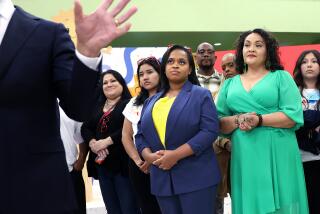Peace Prodigy : Teenager Establishes Online Dialogue for Mideast Youths
- Share via
Sixteen-year-old Andrew Friedman admits he tends to be passionate about his interests.
As a child, he wanted to be a fireman and transformed a corner of his home into a station house. Years later, as a dedicated autograph hound, he managed to get Bill Clinton, Yitzhak Rabin and Yasser Arafat to sign a photo of the 1993 PLO-Israeli peace treaty for him. He even met all three in person.
Friedman and his family leave tonight for London, where he will accept an award for the latest object of his attentions, a creation called CyberPeace. The project, inspired by that historic photo of the three world leaders, allows students in Israeli, Palestinian and Jordanian schools to correspond with one another using donated computers.
The prize is being bestowed by American Community Schools, a group of overseas American and international schools with campuses in 50 countries. Competition for the prize was open to students whose work promotes understanding among cultures and who attend American international or independent schools.
Friedman, an 11th-grader at Crossroads School in Santa Monica, said he plans to use the cash prize of 1,000 British pounds (about $1,600) to buy more CyberPeace equipment.
Basic communication, he thinks, has benefits for the Middle East, “especially young people, who haven’t crystallized all their opinions yet on each other,” he said, “and may still be open-minded enough to work through the hate that they’ve been programmed with.”
The effort that made it possible for some 90 students to bridge their cultural gaps was all Friedman’s.
When he was just 14, he persuaded Packard Bell to contribute three computers, then bought one more with private donations. He sought help from an Israel-based organization to get the machines installed, and coaxed El Al Airlines into shipping them for next to nothing.
Now, thanks to Friedman, students in one Jewish and one Arab Israeli school and in one Palestinian school write back and forth regularly. A fourth school, in Jordan, will be online soon.
“We hope there will be many things of ourselves that [will be] shared between us,” wrote one group of Arab students in signing their letter to five Jewish teenagers.
Students write in English for now, though Friedman said he is close to receiving a donation of software that will allow multilingual exchanges. In addition to talking peace, students talk about sports, reading, listening to the Spice Girls and their homework.
In creating CyberPeace, Friedman has written his share of letters, too, mostly appeals to companies for computers and funding.
“I’ve learned that if I gave up after the 50th time being rejected by a company that I still would never accomplish anything,” Friedman said. “The persistence factor is probably one of the most important, especially dealing with the Middle East, where things change, like, in an instant.”
Ann Colburn, director of the upper school at Crossroads and Friedman’s former journalism teacher, describes Friedman as a born writer with a quick sense of humor who’s nonetheless rather shy and self-effacing.
“You just don’t see a lot of kids reach out into the world the way Andrew has,” Colburn said.
Friedman’s interest in current affairs is illustrated on his bedroom walls, which feature signed photos of Jordan’s King Hussein, the Supreme Court, Nelson Mandela and others. The most precious is one of Rabin, which is framed with a personal letter the slain Israeli leader wrote to Friedman.
“He was, I guess, my hero,” Friedman said, “and I wanted to show him that he had impacted me in this way and caused me to take action and to work for my generation.”
Some people don’t take him seriously because of his age, he said, and occasionally he feels overwhelmed by the scope of his dreams for the future.
In the short term, Friedman wants to help CyberPeace become an integrated part of the schools’ curricula, and upgrade the system so the correspondence is in real time. In the longer term, he may study foreign relations in college.
“There’s tons more that I want to do,” Friedman said. “I’m by no means finished.”
More to Read
Sign up for Essential California
The most important California stories and recommendations in your inbox every morning.
You may occasionally receive promotional content from the Los Angeles Times.













